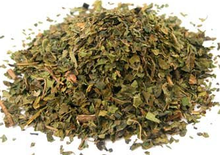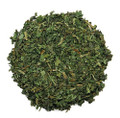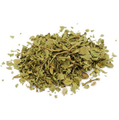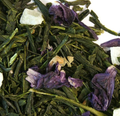 Loading... Please wait...
Loading... Please wait...- Home
- Bulk Herbs
- Herbs (O-P)
- Papaya Leaf
- Home
- Herbs from Hawaii
- Papaya Leaf
Product Description
Papaya Leaf
Organically Grown - Hawaii, USA
Also Known As - Carica papaya, Custard Apple Leaf.
Overview - Papaya grows in tropical climates. It is very sensitive to frost and flooding. It is very susceptible to parasites, disease and pests. The fruit is widely available in the produce section of grocery stores.
Medicinal Uses - Internally, Papaya is taken for digestive problems and can calm disturbances in the gastrointestinal system. Papain, the enzyme in the herb, dissolves and digests protein, and is often used in meat tenderizers. This enzyme can also break down wheat gluten, which helps those people who suffer from celiac disease.
- It can ease heartburn and it can stimulate the appetite. It is a good herbal remedy to settle a stomach, whether it is upset from nerves or from motion sickness. It can also be used to help with morning sickness. This herb has been used as a method to rid the body of parasites. Current studies are showing it's promise in treating the herpes simplex virus. It can also prove useful for slipped discs, pinched nerves and inflammatory bowel conditions.
- It contains compounds that are similar to estrogen and has been used to increase milk production, help with childbirth and to increase a woman's sex drive. It has also been used to promote menstruation. The seeds are considered aphrodisiacs by the aborigines of Australia. It may also lower your risk for age-related macular degeneration.
- Externally – Papaya has been used to treat snakebite, as it helps to degrade the venom. It is also used for insect stings, acne, heal scaly eczema, heal wounds and get rid of warts and corns. The juice has been used to fade freckles. The seeds can be chewed to freshen the breath.
Other Uses – It is eaten as a fruit and can be cooked like a vegetable when unripe. The seeds are also edible. Papaya has been used to control termites. Papaya is used extensively in cosmetics, particularly in salves, facial creams and shampoos.
Parts Used - The fruit, juice, seeds and enzymes are used medicinally.
Precautions - If you take blood thinners, don't take this herb without consulting your physician. The herb is a uterine stimulant, so pregnant women should take with caution. It may also interfere with a fertilized egg adhering to the wall of the uterus. If you are allergic to latex, do not take this herb. Inhaling may cause allergies.
Suggested - Papaya is commercially available as capsules, tablets and other preparations and can be used in teas or infusions. Follow the dosage instructions on the label for the best results. The normal dose is 2 capsules taken once or twice per day with water at mealtime.
Disclaimer - The information presented herein by Mountain Maus’ Remedies is intended for educational purposes only. These statements have not been evaluated by the FDA and are not intended to diagnose, cure, treat or prevent disease. Individual results may vary, and before using any supplements, it is always advisable to consult with your own health care provider.
















